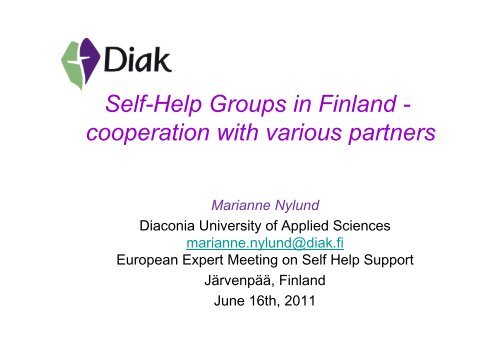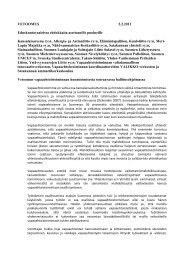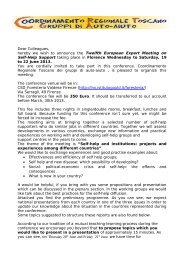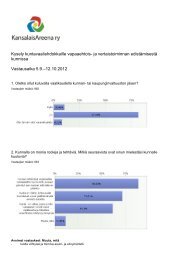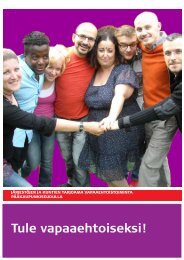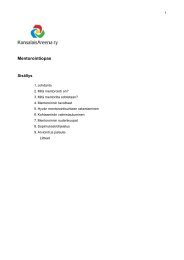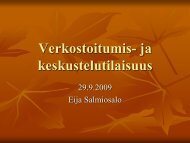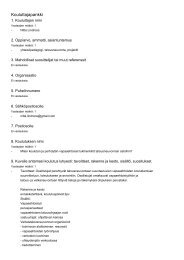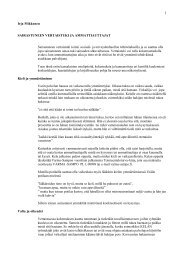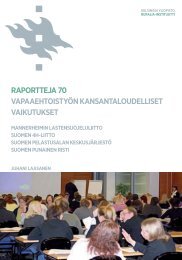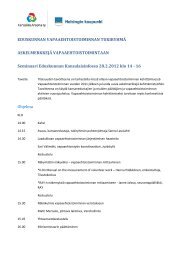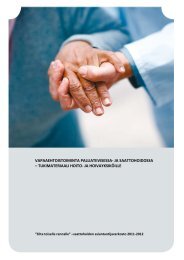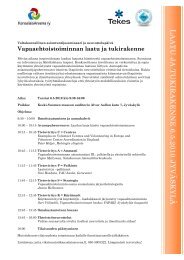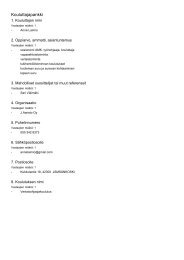Self-Help Groups in Finland - cooperation with ... - Kansalaisareena
Self-Help Groups in Finland - cooperation with ... - Kansalaisareena
Self-Help Groups in Finland - cooperation with ... - Kansalaisareena
You also want an ePaper? Increase the reach of your titles
YUMPU automatically turns print PDFs into web optimized ePapers that Google loves.
<strong>Self</strong>-<strong>Help</strong> <strong>Groups</strong> <strong>in</strong> F<strong>in</strong>land -<br />
<strong>cooperation</strong> <strong>with</strong> various partners<br />
Marianne Nylund<br />
Diaconia University of Applied Sciences<br />
marianne.nylund@diak.fi<br />
European Expert Meet<strong>in</strong>g on <strong>Self</strong> <strong>Help</strong> Support<br />
Järvenpää, F<strong>in</strong>land<br />
June 16th, 2011
Content of the presentation<br />
Introduction<br />
Def<strong>in</strong>ition<br />
Historical background<br />
Organisational structures<br />
Chang<strong>in</strong>g roles of self-help groups and<br />
professionals<br />
Current issues – Future challenges<br />
Marianne Nylund 16.6.2011
Introduction<br />
• <strong>Self</strong>-help groups and mutual support<br />
<strong>in</strong>creased <strong>in</strong> F<strong>in</strong>land dur<strong>in</strong>g last 20 years<br />
• All citizens can be part of a self-help group <strong>in</strong><br />
some stage <strong>in</strong> their life cycle<br />
• The issues varies from questions concern<strong>in</strong>g<br />
prevent<strong>in</strong>g perspective of child rais<strong>in</strong>g and<br />
social relations to improv<strong>in</strong>g people’s life<br />
situations concern<strong>in</strong>g addictive behavior,<br />
mental health problems, illness, disability,<br />
divorce, death of a family member etc.<br />
Marianne Nylund 16.6.2011
Why <strong>in</strong>creased <strong>in</strong>terest<br />
<strong>in</strong> SHGs<br />
• Crisis <strong>in</strong> welfare state/society<br />
• Is there a lack of professional support Long<br />
wait<strong>in</strong>g times to receive help<br />
• Lack of social networks<br />
• Citizen <strong>in</strong>itiatives are grow<strong>in</strong>g<br />
belief <strong>in</strong> experiential knowledge<br />
Criticism of professional/theoretical<br />
knowledge<br />
Marianne Nylund 16.6.2011
Def<strong>in</strong>ition <strong>in</strong> the<br />
F<strong>in</strong>nish context<br />
• A group of people who meet each other<br />
regularly (face-to-face or virtually) to share<br />
experiences and to receive <strong>in</strong>formation <strong>in</strong> a<br />
personal life situation, health or social issue.<br />
• ”Based on mutual support & shar<strong>in</strong>g similar<br />
life situation or concern” (Nylund 2000, 20)<br />
Marianne Nylund 16.6.2011
Def<strong>in</strong>ition by a SHG member<br />
”Mutual support means<br />
that k<strong>in</strong>d of help and support<br />
that only people who have experienced<br />
similar k<strong>in</strong>ds of life situations,<br />
can give to each other to cope <strong>with</strong> the<br />
situation –<br />
and no one else can give that k<strong>in</strong>d of<br />
support.”<br />
Marianne Nylund 16.6.2011
Historical background<br />
• Mutual support and reciprocial help have long<br />
traditions <strong>in</strong> the F<strong>in</strong>nish social policy start<strong>in</strong>g from the<br />
end of 1800s (Jaakkola 1996)<br />
• Ideas of mutualism came to F<strong>in</strong>land from Germany<br />
and United K<strong>in</strong>gdom<br />
• Work<strong>in</strong>g class people established mutual aid<br />
associations to create cont<strong>in</strong>gency funds to provide<br />
protection from social risks, such as sickness, burial<br />
and retirement<br />
• These <strong>in</strong>surance societies became part of the state<br />
pension and <strong>in</strong>surance systems <strong>in</strong> 1937 (the Pension<br />
Law) and 1963 (the Sickness Insurance).<br />
Marianne Nylund 16.6.2011
Modern SHGs 1940-80s<br />
• AA-groups <strong>in</strong> 1946, one of the first ones <strong>in</strong><br />
Europe (Mäkelä 1988)<br />
• Modern SHGs based on immaterial support,<br />
<strong>in</strong>stead of material support (mutual aid<br />
groups): identity, well-be<strong>in</strong>g, personal growth<br />
• SHGs deal<strong>in</strong>g <strong>with</strong> social and health issues:<br />
psychical disabilities and mental health, s<strong>in</strong>gle<br />
parenthood, parents of children <strong>with</strong> special<br />
needs<br />
• -> similar patterns <strong>with</strong> other European<br />
countries and USA<br />
Marianne Nylund 16.6.2011
SHGs <strong>in</strong> 1990s<br />
• In the 1990s, <strong>in</strong>crease of groups for<br />
unemployed people, people <strong>with</strong> mental<br />
health issues, and care givers for relatives<br />
<strong>with</strong> long term illness (Nylund 1999, 2005)<br />
• Accord<strong>in</strong>g to a national mapp<strong>in</strong>g of self-help<br />
groups <strong>in</strong> 1994s (n=173 groups)<br />
ma<strong>in</strong> issues discussed <strong>in</strong> the groups were:<br />
mental health, substance abuse, physical<br />
illness or disability, life crises (divorce, death<br />
of a spouse or children), and women issues<br />
(Nylund 2000b).<br />
Marianne Nylund 16.6.2011
Types of groups <strong>in</strong><br />
1990-2000s<br />
• <strong>Groups</strong> for children and young people (Taitto 2003;<br />
L<strong>in</strong>droos).<br />
These groups differ from adults’ groups because<br />
they are often lead by professionals or adult<br />
volunteers because the vulnerability of children<br />
and young people (Nylund 2005, 200)<br />
• <strong>Groups</strong> for immigrants, differ.ethnic backgrounds<br />
(Martika<strong>in</strong>en 2006): Grow<strong>in</strong>g number of immigrants <strong>in</strong><br />
F<strong>in</strong>land after early 1990s (refugees, asylum<br />
seekers, marriages, work and studies; EU labour<br />
marget)<br />
Marianne Nylund 16.6.2011
Research <strong>in</strong>terests <strong>in</strong> self-help groups<br />
• Research on AA-groups, comparative studies<br />
(Mäkelä 1980-1990s)<br />
• Phd thesis (social policy, social work, sociology)<br />
AA-groups: therapeutic <strong>in</strong>teraction (Arm<strong>in</strong>en 1998)<br />
<br />
Overview, groups for unemployed people (Nylund<br />
2000)<br />
Mental health, substance abuse (Hyväri 2001)<br />
Chronic illnesses (Mikkonen 2009)<br />
• Licenciate thesis (social work)<br />
Immigrant women (Harju-Tolppa 2004)<br />
<br />
Depression (Jantunen 2008/nurs<strong>in</strong>g)<br />
Women and substance abuse (Palojärvi 2009)<br />
Marianne Nylund 16.6.2011
Organisational structures<br />
• Many self-help groups operate under nonprofit<br />
social and health associations<br />
• <strong>Groups</strong> meet at the localities of<br />
organisations, self-<strong>in</strong>itiated or <strong>in</strong>itiated by<br />
professionals<br />
• No self-help centres or clear<strong>in</strong>ghouses <strong>in</strong><br />
F<strong>in</strong>land<br />
Recruition and <strong>in</strong>formation through NGOs<br />
(eg. Citizen Arena), municipal social and<br />
health centers, hospitals<br />
Marianne Nylund 16.6.2011
Types of SHGs<br />
(Nylund 2000)<br />
Background<br />
organisation<br />
% N<br />
Citizen groups 8 14<br />
Third sector groups 32 57<br />
Public sector groups 12 22<br />
Mixed groups 48 85<br />
Total 100 178<br />
Marianne Nylund 16.6.2011
Initiators and leaders (%)<br />
(Nylund 2000)<br />
I<br />
Initiator of the group<br />
Leader of the group<br />
Private citizen 39 -<br />
Volunteer/ student - 15<br />
Group member - 42<br />
No leader - 9<br />
NGO 19 -<br />
Professional 29 34<br />
Municipality 8 -<br />
Lutheran parish 5 -<br />
Total % 100 100<br />
N=178* (more than one<br />
<strong>in</strong>itiator/leader)<br />
211 194<br />
Marianne Nylund 16.6.2011
Fund<strong>in</strong>g<br />
• <strong>Self</strong>-help support projects funded by different<br />
sources:<br />
Slot Mach<strong>in</strong>e Association<br />
(http://www.ray.fi/<strong>in</strong>english/)<br />
NGOs (voluntary social and health organis.)<br />
Municipalities<br />
Members’ <strong>in</strong>dividual contributions<br />
Fund<strong>in</strong>g can be <strong>in</strong> form of meet<strong>in</strong>g places,<br />
network<strong>in</strong>g, free advertis<strong>in</strong>g, leaflets, etc.<br />
Marianne Nylund 16.6.2011
Chang<strong>in</strong>g role of SHGs and<br />
professionals<br />
• <strong>Self</strong>-help groups and mutual support is<br />
sometimes understood as a work<strong>in</strong>g method of<br />
social and health professionals or a rival of<br />
professionals (Hyväri 2005)<br />
• In the F<strong>in</strong>nish context, self-help groups<br />
cooperate very closely <strong>with</strong> public welfare<br />
services, professionals, lay persons and<br />
volunteers<br />
• Politicians see groups as a way to save public<br />
fund<strong>in</strong>g<br />
Marianne Nylund 16.6.2011
Chang<strong>in</strong>g role of SHGs and<br />
professionals<br />
Three different types of <strong>cooperation</strong> (Hyväri 2005):<br />
1) Professionals ”take over” self-help group<br />
activities<br />
2) <strong>Self</strong>-help groups as <strong>in</strong>dependent actors<br />
beside professionals<br />
3) <strong>Self</strong>-help groups act <strong>in</strong> close <strong>in</strong>teraction <strong>with</strong><br />
public services<br />
Marianne Nylund 16.6.2011
1)Professionals ”take over” self-help<br />
group activities<br />
• Professionals ”tame” all attempts for<br />
opposite op<strong>in</strong>ions and new ideas<br />
• Professionals use self-help groups as a<br />
social work or therapy method<br />
• Examples <strong>in</strong> F<strong>in</strong>land how lay activities <strong>in</strong> AAgroups<br />
become part of official substance<br />
abuse care and professional activities (Mäkelä<br />
et al. 1996; Niemelä 1999)<br />
Marianne Nylund 16.6.2011
2) <strong>Self</strong>-help groups as <strong>in</strong>dependent<br />
actors beside professionals<br />
• Voluntary and self-<strong>in</strong>itiated action should not<br />
be mixed <strong>with</strong> professional work<br />
• <strong>Self</strong>-help activities are lead by ideological<br />
goals that differ from professional social and<br />
health work<br />
• Public welfare system can provide support<br />
and promote different types of self-help<br />
group activities by offer<strong>in</strong>g meet<strong>in</strong>g places,<br />
tools (technical etc.) and f<strong>in</strong>ancial support<br />
Marianne Nylund 16.6.2011
3) <strong>Self</strong>-help groups act <strong>in</strong> close<br />
<strong>in</strong>teraction <strong>with</strong> public services<br />
• When group members and professionals<br />
<strong>in</strong>teract and communicate closely, both<br />
parties benefit<br />
• Need for professionals who understand the<br />
ideology of mutual support and importance<br />
of shar<strong>in</strong>g experiences <strong>with</strong> peers<br />
• Professional can refer people to self-help<br />
groups when therapeutical support is not<br />
enough, is not available or is not needed<br />
anymore<br />
Marianne Nylund 16.6.2011
Current issues –<br />
Future challenges<br />
• <strong>Self</strong>-help groups have no legal position <strong>in</strong><br />
the F<strong>in</strong>nish welfare system or legislation<br />
• Despite of positive development, some<br />
professionals still have negative attitudes<br />
and lack of knowledge of SHGs<br />
• Need to tra<strong>in</strong> and cooperate more between<br />
self-help group actors and professionals<br />
• Researchers <strong>in</strong>vited to sem<strong>in</strong>ars <strong>in</strong>stead of<br />
local self-help group members<br />
Marianne Nylund 16.6.2011
Current issues –<br />
Future challeges<br />
• Members of self-help groups acquire plenty<br />
of <strong>in</strong>formation of various social and health<br />
issues<br />
• Critiques of social and health services and<br />
ways how professionals work<br />
• How this <strong>in</strong>formation can be cumulated and<br />
critics turned to constructive tool for change<br />
Marianne Nylund 16.6.2011
Current issues –<br />
Future challeges<br />
• How members can be active actors and tell<br />
their stories and ideas to professionals,<br />
authorities and decision makers<br />
• What k<strong>in</strong>d of need there are to have<br />
someone as a mediator between self-help<br />
groups and professionals /decision makers<br />
Marianne Nylund 16.6.2011
Current issues –<br />
Future challeges<br />
• What k<strong>in</strong>ds of possibilities members have<br />
to <strong>in</strong>fluence their personal life<br />
to make changes <strong>in</strong> social and health<br />
services<br />
• What k<strong>in</strong>ds of best practices <strong>in</strong> self-help<br />
support there exist <strong>in</strong> different countries<br />
Marianne Nylund 16.6.2011


